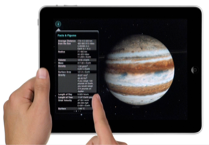There are gender wars, and then there are casualties. It wasn’t until 2011 that the behemoth toymaker LEGO acknowledged girls’ desire to build with bricks, even though the company had long before made a seemingly effortless pivot to co-branding, video games, and major motion pictures. So it’s little wonder that girls face all-too-real obstacles when […]
Read moreTag: mobile

IDEA’s second mobile app, WikiNodes (see app store link) puts the encyclopedic knowledge of Wikipedia at the fingertips of iPad users. Articles are displayed as nodes that can be touched, dragged and spun around — showing the relations between articles and sections of articles. The app is currently featured in Apple’s app store.
Here’s a 30 second demo:
The app is based on IDEA’s SpicyNodes system for displaying and navigating information using nodes (see SpicyNodes.org). The SpicyNodes approach has great potential for other subjects, from browsing museum collections and archives, to browsing flora & fauna, and many other kinds of linked data.
 There is no better way to reach underserved audiences than to drive directly to them. Mobile museums, in converted RVs or semi-trailers, are delivering history, science and art experiences. Here are two great examples.
There is no better way to reach underserved audiences than to drive directly to them. Mobile museums, in converted RVs or semi-trailers, are delivering history, science and art experiences. Here are two great examples.
History
Reaching rural audiences for $10.71 per visitor, the “Van of Enchantment” brings cultural history to schools and public events in New Mexico — at no cost to visitors. New Mexico’s rich history traces back at least 11,000 years, and includes a flourishing Pueblo community in the 13th century, Spanish conquistadors and colonists in the 16th century, and railroads in the late 19th century. (more…)
 The National STEM Video Game Challenge, awarded the $50k grand prize last week to a professional team that did not meet the eligibility criteria.
The National STEM Video Game Challenge, awarded the $50k grand prize last week to a professional team that did not meet the eligibility criteria.
This story came to my attention last week, when I wrote a blog post about a cool online science game for Middle School kids which won the grand prize as part of the contest run by the Joan Ganz Cooney Center at Sesame Workshop (the parent organization of Sesame Street) and E-Line Media. That article briefly mentioned anomalies in the contest, and the Cooney Center sent me an email: “Please take this article down as soon as possible because of a legal issue that is pending.” This made me wonder, is there a scandal on Sesame Street?
 Games on mobile devices are a new way to engage museum visitors. Two companies gave presentations at yesterday’s Museums & Mobile 2011 online conference.
Games on mobile devices are a new way to engage museum visitors. Two companies gave presentations at yesterday’s Museums & Mobile 2011 online conference.
One popular type of game is a miniature scavenger hunt, called “location-gaming.” The premise is that players go places (e.g., a restaurant or park), do fast, simple tasks (like typing something into their phone, or uploading a photo of something), and win a reward (the reward can virtual “points,” or something tangible, like a free postcard or sandwich). Other types of games are more thematic, such as creating playing-card “battles” between characters that appear in art. (more…)
 Museums are going mobile, and many companies are eager to help. At yesterday’s Museums & Mobile 2011 online conference, several vendors promoted their wares. This is a summary of products, approaches, and some alternatives… (more…)
Museums are going mobile, and many companies are eager to help. At yesterday’s Museums & Mobile 2011 online conference, several vendors promoted their wares. This is a summary of products, approaches, and some alternatives… (more…)
 On the screens of millions of iPad and other mobile devices, moons and stars, elements and molecules swirl beneath our fingertips. Developer Mike Howard says he wants to “make you feel like you are actually there in orbit.” Theodore Gray wants you to look at the periodic table and be transported to the world of Harry Potter, feeling as “if you checked out a magical version of The Elements from the Hogwarts library.”
On the screens of millions of iPad and other mobile devices, moons and stars, elements and molecules swirl beneath our fingertips. Developer Mike Howard says he wants to “make you feel like you are actually there in orbit.” Theodore Gray wants you to look at the periodic table and be transported to the world of Harry Potter, feeling as “if you checked out a magical version of The Elements from the Hogwarts library.”
Apps represent a shift in how students and the public learn about science. Currently, the best science apps are not being created by museums, traditional publishers, or curriculum developers — They are being created by enthusiastic solo developers, research centers, and new software companies with a penchant for science and public education. We’ll look at what motivated these app creators, what it took to make the apps, and how successful they have been. (more…)
 Mobiles and eBooks will be a big deal in higher education by the end of the year, predicts a panel of 42 experts in education, technology, and business in a new report jointly released by a consortium and association related to higher education. These predictions are gathered in the “2011 Horizon Report,” released today.
Mobiles and eBooks will be a big deal in higher education by the end of the year, predicts a panel of 42 experts in education, technology, and business in a new report jointly released by a consortium and association related to higher education. These predictions are gathered in the “2011 Horizon Report,” released today.
Also, coming soon, these experts predict that by 2014, augmented reality and game-based learning will be important. And by 2016, they predict students will often use gestures to interact with computers, and that learning analytics will be common.
Stepping into emerging markets with informational infrastructure. An “obsolete” computer in the West might be useful and well-received by poorer communities. Problem The digital divide that exists between those with access to technology and those without is exacerbated by the constant improvements – revisions and upgrades – generated by software developers and hardware manufacturers in


 Today,
Today,